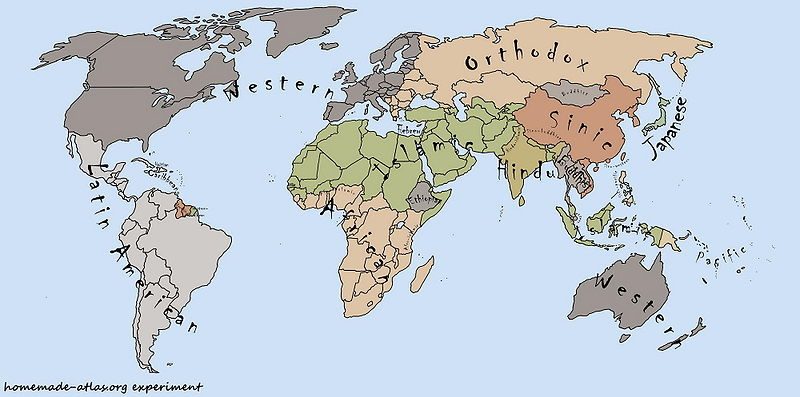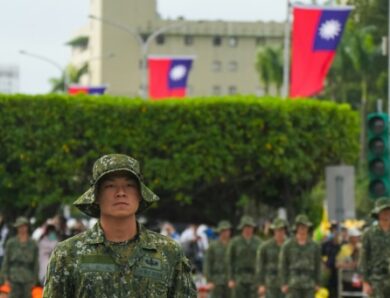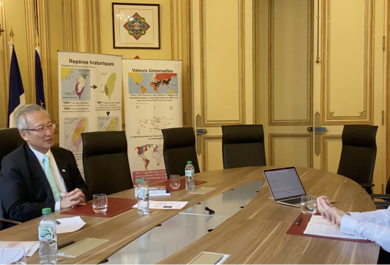
“We will soon miss the Cold War”: The meaning of 1990 for World Geopolitics
By Côme Bonnet-Badillé
After half a century of a bipolar world order, the end of the Cold War marked the beginning of a new era, widely welcomed with enthusiasm by political leaders and populations around the world; constant confrontation and nuclear threat were over and promises of freedom lay ahead. But while the first years of the world war were chaotic, there is a wide consensus amongst scholars on the fact that the Cold War order provided a status-quo stability. The world was divided in two ideological sides, but conflict had become rare; The Soviet Union and the USA mostly competed on ideological rather than geographical battlegrounds, and the last serious threat of worldwide conflict dated back to the Cuban crisis of 1962. Since then, both competitors had learnt to cohabitate and the three decades following this crisis were arguably the most peaceful of the 20th century. This stability had now turned into uncertainty, rationally feared by experts of international relations and ultimately raising concerns against the tide of joy mostly expressed at the time.
While a first look at the concerns raised seems to display a wide range of disconnected arguments, providing a list of such arguments without examining their relation and origins would be an incomplete way to treat the subject. The reasons that led commentators to argue that “we will soon miss the Cold War”[1] are a good mirror of the challenges that faced the “New World Order”[2] , dividing experts sharing a different perspective towards international relations.
The two main ones were unsurprisingly the Realist and the Liberal schools of thought. The former considers that the order in international relations mostly depends on the conflicts and clashes between competing states, naturally prone to confrontation rather than cooperation. Thus, the end of a stable, bipolar system will resurface anarchy between states, swiftly rising the chances of international conflicts. For liberals, the issue of the Cold War is more positive; they consider that worldwide order depends on international cooperation and the influence of a widespread ideology of freedom and human rights. What is widely considered as an American win left the doors wide open for a spread of the liberal ideology in the world, and the dawn of a time of supranational organisations, worldwide agreements and peace.
It is therefore coherent to consider that nostalgia of Cold-War times would be linked to the realist school of thought rather than the liberal one. However, it would be a mistake to downplay the concerns of the latter; scepticism towards the new era was also liberal, as worldwide uncertainty can never be perceived as fully good news.
Interestingly enough, the commentators raising the most serious concerns towards the future adopt a realistic perspective in their geopolitical analysis of the post-Cold War world. The realistic approach towards politics sees states as central actors, rather than supranational authorities, acting rationally for self-protection by trying to outrank neighbours in capacity rather than seeking cooperation. As put by John Mearsheimer, who shaped realist thought, “the international political system is anarchic, which means that each state must always be concerned to ensure its own survival” [3]. Survival being the highest priority for a state, foreign policy concerns will dominate domestic and economic concerns when they come into conflict[4].
Such a volatile context becomes dangerously probable with the end of the Cold War; the sphere of influence of both the Eastern and Western poles was huge, and it was about to wither away. Mearsheimer explains well the virtues of such a bipolar division of the world:
Firstly, bipolarity reduces the possibilities of conflict, leaving only one dyad of tensions open, and secondly, bipolarity calls for equality. A state is more likely to attack when it is significantly stronger than its enemy. In a bipolar world, alliances are impossible and when both powers have a roughly equivalent military force, conflicts are highly unlikely.
Following these arguments, one can easily see why the end of bipolarity is worrisome. Parts of the world dominated by one of the two giants are likely to shift back into a multipolar system, where the dyads of tensions are multiplied, military forces are unequal from one country to another, and alliances possible.
Mearsheimer holds that the first and most risky theatre of such a brutal change is Europe. The end of the Soviet Union let loose 21 countries out of the Russian sphere, and he expected NATO to withdraw from Europe, as “the Soviet threat provides the glue that holds NATO together” [5]. Europe would be back in its pre-World War Two state, with uncertain borders and divided ethnic groups to add to the problem. Such a situation paired with the potential for conflict of a multipolar system previously depicted leads Mearsheimer to the conclusion that there is a “considerable potential for conflict.” Let alone the nuclear threat, that I will address later.
Adopting a realist stance therefore puts Europe in a very tense situation for the last decade of the twenty-first century. Robert Kaplan makes an even more global claim by extending the realist conception of multipolarity as a Hobbesian state of nature to Africa:
In The Coming Anarchy, he predicts “the withering away of central governments”, leaving Africa as a vast battleground open to all sorts of conflicts that would be far more intense than potential conflicts elsewhere, as they will occur in an underdeveloped setup. Instability will be exacerbated by the scarcity of resources, tribal conflicts and spread of diseases.
A historical background research confirms Kaplan’s concerns. Africa had been the last theatre of the ideological standoff: The Soviet Union had secured strong bases through partnerships with Angola or Ethiopia, and the USA nurtured good relations with Guinea. African countries benefited from substantial financial support, and the fear of an escalation of tensions led both sides to maintain military support only to domestic revolutions and not to powers in place[6]. Both aspects have contributed to the maintenance of interstate “peace” during the Cold War, with said peace highly susceptible to disappear now that the brace is gone. Agitation in Europe would also cause the withdrawal of post-colonial political influences from the continent, such as France[7].
As central powers leave the zone, the realist logic carried out by Kaplan predicts interstate struggle, in a multipolar “balkanisation of Africa”. Military inequality between Nigeria and its neighbours (Niger, Benin and Cameroon)[8] adds further to the prospects of war.
From a realist perspective, concerns towards the nuclear issue are also important. Quarrelsome states with nuclear technology would drastically raise the chances for large-scale massacres. John Mearsheimer considers two potential scenarios, both of them leading to risky situations.
If no states get a nuclear weapon technology, the potential for conflict would be considerable: as nuclear weapons act as a deterrent (few would risk a war with such a destructive weapon involved), peace in nuclear-free Europe would only depend on the number of poles and the distribution of power. With the former likely to be high and the latter unequal, global war is a serious option.
He sees the current ownership scenario as unlikely, so Europe would either be nuclear-free or witness a nuclear proliferation. Though widespread ownership would create deterrence, such a process is likely to be mismanaged, and the situation would present many risks: current owners would have no incentive to share, unexperienced, often nationalist and aggressive states would have access to a highly dangerous weapon, and there would overall be more fingers prone to press the button. In any way, the cold war bipolar ownership was preferable.
Realist thought therefore conceives a future that will be worse-off without the stability provided by the Cold War, notably strongly assuming a future multipolar order. The USA would therefore not extend their influence over the “grey areas” such as Africa, and NATO would withdraw from Europe.
The geopolitical situation of the time leaves one other possible scenario; far from letting multipolarity come back, the USA would install an ideological hegemony across the world, thus achieving complete worldwide victory.
Liberal thinkers see ideology and transnational cooperation as the cornerstone of international relations, and therefore believed in the coming dominance of supranational organisations such as the United Nations or the European Economic Community with a liberal ideological background fostered by the USA. The coming period would then seem more peaceful than what the realist conception demonstrates, and there would surely be less nostalgia towards the post-Cold War period. But even with a liberal model envisaged, there were some valid reasons to fear what lay ahead.
The first argument linked to the liberal model is the existence of a period of “transitional turbulence”, developed by geographer Saul Cohen and carried out further by Joseph Nye.
The argument states that international politics won’t reach a static order, but rather a dynamic equilibrium, implying a careful balance of influences on a worldwide scale. Such a system is alive, always moving, and Cohen acknowledges that turbulence is a part of these dynamics, as “a necessary concomitant to progress”[9]. He therefore expects such conflicts to burst with the upcoming instability, in “the Quarter sphere of marginality”: sub-Saharan Africa and South America. Indeed, as great powers disappear, freeing subsets from their influence, international politics suddenly evolve way faster than before, fostering destabilization and, ultimately, conflict.
However, Cohen limits this pessimistic claim by stating that it will be temporary if well-managed. The question is to determine if turbulence will be systemic, in which case the Cold War will surely be missed, or a part of a change towards a more integrated world system.
Joseph Nye addresses a similar issue. For him, the transitional turbulence will spawn from the diversity of ideologies that the end of the Cold War favoured[10]. The American model of liberal capitalism won’t be opposed to sole communism anymore, but to more potential competitors, albeit fragmented ones; now that the bipolarity of ideologies is gone, a rise of ideologies that were frozen under the grip of superpowers during the Cold War will naturally respawn, thus diversifying the potential sources of conflict. Nye describes a potentially worldwide phenomenon, with strong opposing ideologies in Europe (ethnic nationalism), South America (neo-Maoism in Peru), Africa and Middle-East (Islamism), increasing the importance of the menace for the future, which might turn out to be more than transitional.
Aside from the natural evolution towards a dynamic equilibrium, Nye also raises more durable concerns. For him, the liberal model has a weakness in the sense that it is state centric; it is therefore not applicable in case of interstate tensions[11]. The withering away of the central powers, especially the Soviet Union in the liberal perspective, is once again to blame: its disappearance allowed the independence of ethnically heterogeneous countries in Eastern Europe, fostering domestic tensions that the liberal order can’t solve. In a world where less than 10% of the current 170 states are ethnically homogeneous[12], Nye points out a problem that is hard to ignore and that could cause minor, but widespread conflicts potentially hard to solve.
All these concerns will complicate the future situation even more, as there would only be one global leader to face them all. For half a century, they have been providing unilateral solutions to unilateral problems when dealing with the Soviet Union. They are now faced with more complicated and diverse problems, and they had not demonstrated invincible strength in the first few years of the 1990s: Saul Cohen argued that there would be no “Pax Americana” after the failure from the USA to deal alone with the Gulf War[13]. Many problems with little experience on how to tackle them could only mean bad news for the future.
Finally, the liberal turn in world politics, likely to see the dominance of a single ideology, creates a certain feeling of nostalgia. Far from any pragmatic concerns towards politics, the argument is nonetheless valid as nostalgics will miss the Cold War.
In ‘The end of History?’, Francis Fukuyama develops the idea of a complete success of liberal views to its extreme, adapting the Hegelian concept of the “end of history” to the current situation. As Hegel considered that History would culminate in a moment in which a society would become victorious, Fukuyama writes that such a moment has come with the end of the ideological struggle between liberal capitalism and communism.
Fukuyama’s conception is interesting because it adopts a completely different approach to the one adopted by most commentators: while all the other ones will miss the Cold War because it was a time of relative peace compared to the coming challenges, Fukuyama will miss the challenges compared to the settling worldwide peace. He explains his argument by linking conflicts to the liveliness of competing conceptions of politics. “The willingness to risk one’s life for a purely abstract goal, the worldwide ideological struggle that called forth daring, courage, imagination and realism will be replaced by economic calculations, the endless solving of technical problems, environmental concerns, and the satisfaction of sophisticated consumer demand.”[14] The complete realisation of the liberal model will eliminate the passions and ideals, the main writers of history, which Fukuyama will miss as he clearly states that “the end of history will be a sad time”[15].
Concerns are far more important for the realists than for the liberal view, which mostly tends to consider some of the upcoming turbulence as a ‘necessary step’ towards the achievement of a more peaceful order in which a dominant ideology will prevail. In other words, where realists see upcoming conflict with no prospects of resolution, liberals can conceive an end to the tunnel of instability.
However, it is interesting to note that some common issues break the dichotomous conception of post-Cold War concerns. The new environmental challenge is considered by many as a very serious threat that goes beyond political conceptions of realism or liberalism, as it poses environmental security as a challenge for traditional approaches to international relations.
Commentators argued that the end of the Cold War would see a drastic increase in environmental damage: not only would the spread of liberal ideas develop worldwide trade, the acceleration of commercial exchanges and ultimately pollution and exhaustion of the world’s resources, but the end of the bipolar rivalry is also dramatic as its environmental benefits, though greatly overlooked, were primordial. As Stephen Brain would argue later on, “the Cold War, for all its environmental costs, brought in its train a hidden benefit: the creation of an international ideological competition that made meaningful environmental agreements more likely.”[16] While many environmental agreements had been signed since the 1970s until the 1987 Montreal protocol[17], Brain argues that the sudden drop in agreements since then was expectable: the Soviet Union was the driver of these initiatives as ecology was a popular combat that didn’t accord with capitalist values. In reaction to the lack of measures put on by the USA, the Soviet Union announced its willingness to show the way toward a better alternative through the 24th and 25th party congresses of 1971 and 1976 as an attempt to appear as a global leader in this domain, while the USA followed the initiatives in return[18].
With the end of this ideological competition, and the disappearance of the main driver of ecological agreements, there might be a temptation from the United States to be more lenient towards environmental regulations as they’ve already won: in itself, the future prospect of worldwide pollution is another reason to miss the Cold-War.
But concerns go further, and while the environmental concern is common, there are differing views on how the issue could cause further problems in the future. Homer-Dixon sees the environmental issue as mostly attached to the liberal perspective, stating that “the modern realist perspective that is often used to understand security problems is largely inadequate for identifying and explaining the links between environmental change and conflict.”[19] This idea would therefore see future issues as tensions in the process of finding common solutions to transnational problems, in the same spirit than that of Cohen’s “ultimate equilibrium” described above. On the other hand, there is also a realist side to the environmental issue brought to light by Robert Kaplan, who sees the coming environmental issues as another factor of tensions between states: scarcity of resources would cause territorial struggles, and ecological migrations ethnic problems on a large scale. The environment therefore has a realist pendant, that links back to the ideas of interstate conflicts for territorial dominance.
There were many reasons to fear the post-Cold War period, and many thinkers addressed the matter, through different perspectives. What is interesting is that analysing the different perspectives to the question of why the Cold War will be missed puts to light common issues raised from all sides. In other words, the reasons to fear the future were similar for everyone: the upcoming uncertainty, caused by the withering away of central powers, the expected rise of new movements, and a new perspective towards environmentalism. This provides a good summary of what the end of the Cold War represented, partly explaining why it is considered as such a key moment in history (and even by some as the end of history). The question: “Why will we soon miss the cold war?” Is another way to ask “What will be the upcoming challenges?”. From common concerns, liberals and realists draw different hypotheses. Liberal thinkers are unsurprisingly more positive in their analysis. The concerns they raise are serious, but can be dealt with through efficient cooperation, as a part of a natural process of evolution. Realists, however, tend to describe the future as a fatality; conflicts will surely happen, the only question is whether they will be worldwide or contained.
Côme Bonnet-Badillé
BIBLIOGRAPHY:
Brain, S. (2014) ‘The appeal of appearing green: Soviet-American ideological competition and Cold-War environmental diplomacy’, Cold War History, 16(4): 443-462
Cohen, S. B. (1991) ‘Global Geopolitical Change in the Post-Cold War Era’, Annals of the Association of American Geographers 81(4): 551-580
Fukuyama, F. (1989) ‘The end of History?’, The National Interest 16: 3-18
Homer-Dixon, T. F. (1991) ‘On the Threshold: Environmental Changes as causes of Acute Conflict’, International Security 16: 76-116
Kaplan, R. (1994) ‘The Coming Anarchy’, The Atlantic.
Klinghoffer, A. J. (1980) ‘Soviet Union and Angola’, Army War College
Mearsheimer, J. (1990) ‘Back to the Future: Instability in Europe after the Cold War’, International Security 15(1): 5-56
Mearsheimer, J. (1990) ‘Why We Shall Soon Miss the Cold War’, Atlantic Monthly 266(2): 35-50.
Muelhenbeck, P. E. (2008) ‘Kennedy and Toure: A success in personal diplomacy’, Diplomacy and Statescraft, 19(1): 69-95
Nye, J. S. (1992) ‘What New World Order?’, Foreign Affairs, 71(2): 83-96
[1] Mearsheimer (1990)
[2] Nye (1992)
[3] 3 Mearsheimer (1990) p.44
[5] Mearsheimer (1990) p.52
[6] Klinghoffer (1980)
[7] Kaplan (1994)
[9] Cohen (1991) p. 552
[10] Nye (1992) p.85 10 p.90
[11] Nye (1992) p.91
[13] Cohen (1991) p. 557
[14], [15] Fukuyama (1989) p. 18
[16] Brain (2016) p.443 16 p.457 [17] p.458
[18] Kaplan (1994)
[19] Homer-Dixon (1991) p.84





No Comment